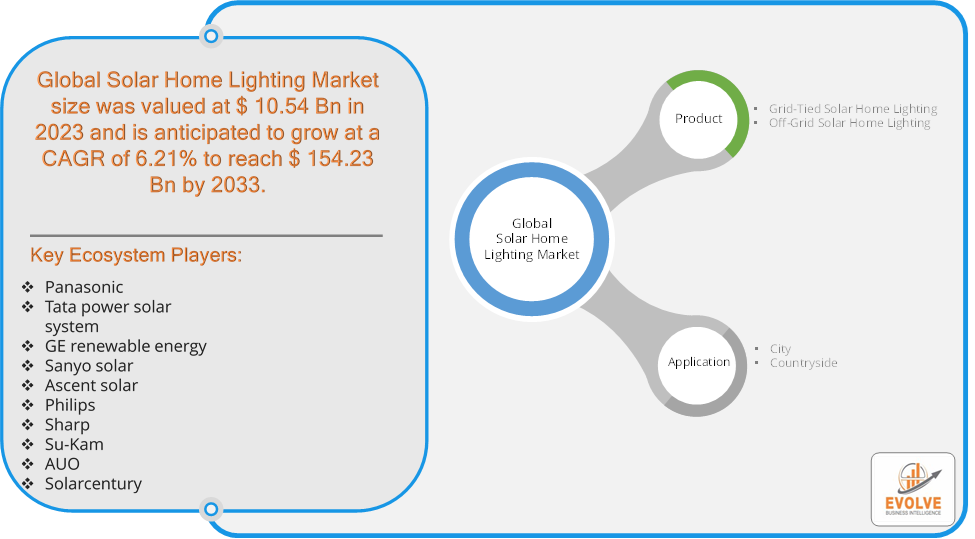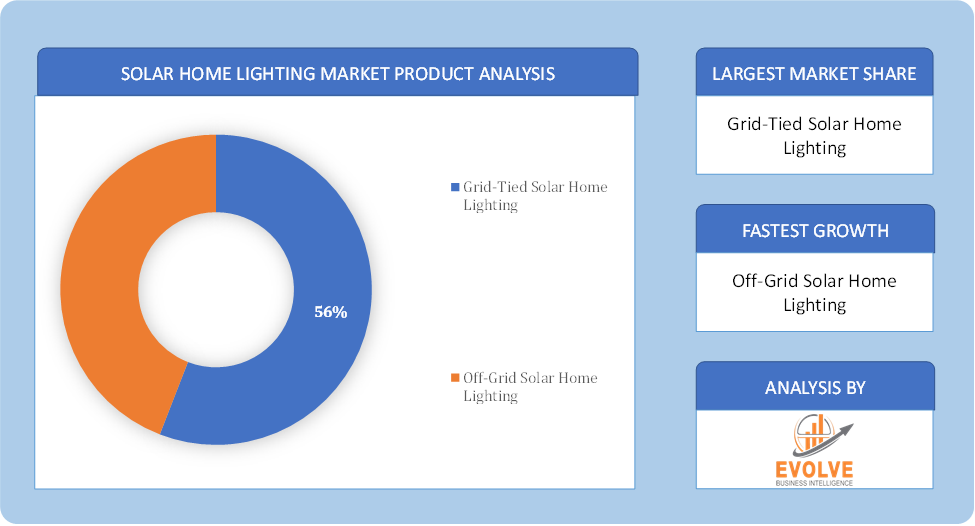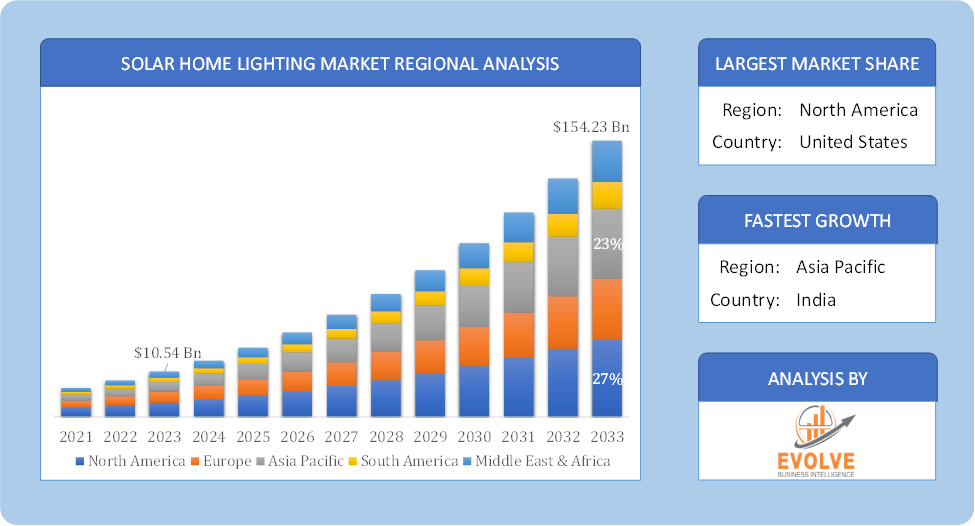Solar Home Lighting Market Analysis and Global Forecast 2023-2033
$ 1,390.00 – $ 5,520.00Price range: $ 1,390.00 through $ 5,520.00
Solar Home Lighting Market Research Report: Information By Product (Grid-Tied Solar Home Lighting, Off-Grid Solar Home Lighting), By Application (City, Countryside) and by Region — Forecast till 2033
Page: 161
Solar Home Lighting Market Overview
The Solar Home Lighting Market Size is expected to reach USD 154.23 Billion by 2033. The Solar Home Lighting Market industry size accounted for USD 10.54 Billion in 2023 and is expected to expand at a compound annual growth rate (CAGR) of 6.21% from 2023 to 2033. The Solar Home Lighting Market refers to the industry involved in the design, manufacture, distribution, and installation of solar-powered lighting systems for residential use. These systems typically include solar panels, batteries, and LED lights. The primary purpose of this market is to provide a sustainable and cost-effective alternative to conventional grid-powered lighting, especially in areas with limited or no access to the electricity grid.
The market is driven by factors such as the increasing demand for renewable energy, government incentives and subsidies, and the need for reliable and sustainable lighting solutions in off-grid areas. It also benefits from technological advancements in solar energy and decreasing costs of solar components.
Global Solar Home Lighting Market Synopsis
The COVID-19 pandemic had several impacts on the Solar Home Lighting Market. The pandemic highlighted the importance of reliable energy sources, particularly in off-grid areas. This led to a greater interest in solar home lighting solutions, as people sought alternative and more resilient energy sources. The pandemic caused significant disruptions in global supply chains, impacting the availability and cost of solar components like panels, batteries, and LEDs. This led to delays in manufacturing and project implementation. Lockdowns and travel restrictions affected the installation and maintenance of solar home lighting systems. Many projects experienced delays due to restrictions on movement and reduced workforce availability.
Solar Home Lighting Market Dynamics
The major factors that have impacted the growth of Solar Home Lighting Market are as follows:
Drivers:
Ø Technological Advancements
Improvements in solar panel efficiency, battery technology, and LED lighting have made solar home lighting systems more affordable, efficient, and reliable, boosting their appeal. The availability of affordable solar home lighting systems and the expansion of distribution networks make it easier for consumers to access and install these systems. New financing models, such as pay-as-you-go (PAYG) schemes and solar-as-a-service programs, make solar home lighting systems more accessible to a broader range of consumers by reducing upfront costs.
Restraint:
- Perception of High Initial Costs and Technological Limitations
Despite decreasing prices, the upfront costs of purchasing and installing solar home lighting systems can still be relatively high, particularly for low-income households. While technology is advancing, there are still limitations related to the efficiency and energy storage capacity of solar home lighting systems, which can affect their performance and attractiveness.
Opportunity:
⮚ Integration with Smart Technology and Technological Integration
Incorporating smart technology, such as smart meters and energy management systems, can enhance the functionality and appeal of solar home lighting solutions, offering better control and efficiency. Advances in battery technology, such as the development of more efficient and longer-lasting batteries, can enhance the reliability and performance of solar home lighting systems.
Solar Home Lighting Market Segment Overview
Based on Product Type, the market is segmented based on Grid-Tied Solar Home Lighting and Off-Grid Solar Home Lighting. The Grid-Tied Solar Home Lighting segment dominant the market. Grid-tied solar home lighting systems combine solar energy with grid electricity. During the day, solar panels generate electricity that powers the home’s lighting and potentially other appliances. Any excess energy can be fed back into the grid, while at night or during cloudy days, the system draws power from the grid.
By Application
Based on Application, the market segment has been divided into City and Countryside. The City segment dominant the market. Many cities are adopting smart city initiatives that focus on sustainability, energy efficiency, and reducing carbon emissions. Solar home lighting fits well into these plans, offering a renewable and decentralized energy source that reduces the burden on the grid.
Global Solar Home Lighting Market Regional Analysis
Based on region, the global Solar Home Lighting Market has been divided into North America, Europe, Asia-Pacific, the Middle East & Africa, and Latin America. North America is projected to dominate the use of the Solar Home Lighting Market followed by the Asia-Pacific and Europe regions.
 Solar Home Lighting North America Market
Solar Home Lighting North America Market
North America holds a dominant position in the Solar Home Lighting Market. The North American market for solar home lighting is relatively mature, with established players and a focus on high-quality products. Solar home lighting systems are used in both residential and commercial settings in North America and in some regions, solar home lighting systems have achieved grid parity, making them a competitive alternative to traditional grid-connected electricity.
Solar Home Lighting Asia-Pacific Market
The Asia-Pacific region has indeed emerged as the fastest-growing market for the Solar Home Lighting Market industry. The Asia-Pacific region is the largest and fastest-growing market for solar home lighting, accounting for a significant portion of global sales. India and China are the key drivers of growth in the region, with large rural populations and government initiatives promoting renewable energy and solar home lighting systems offer a cost-effective alternative to traditional grid-connected electricity in many parts of Asia-Pacific.
Competitive Landscape
The global Solar Home Lighting Market is highly competitive, with numerous players offering a wide range of software solutions. The competitive landscape is characterized by the presence of established companies, as well as emerging startups and niche players. To increase their market position and attract a wide consumer base, the businesses are employing various strategies, such as product launches, and strategic alliances.
Prominent Players:
- Panasonic
- Tata power solar system
- GE renewable energy
- Sanyo solar
- Ascent solar
- Philips
- Sharp
- Su-Kam
- AUO
Scope of the Report
Global Solar Home Lighting Market, by Product
- Grid-Tied Solar Home Lighting
- Off-Grid Solar Home Lighting
Global Solar Home Lighting Market, by Application
- City
- Countryside
Global Solar Home Lighting Market, by Region
- North America
- US
- Canada
- Mexico
- Europe
- UK
- Germany
- France
- Italy
- Spain
- Benelux
- Nordic
- Rest of Europe
- Asia Pacific
- China
- Japan
- South Korea
- Indonesia
- Austalia
- Malaysia
- India
- Rest of Asia Pacific
- South America
- Brazil
- Argentina
- Rest of South America
- Middle East & Africa
- Saudi Arabia
- UAE
- Egypt
- South Africa
- Rest of Middle East & Africa
| Parameters | Indicators |
|---|---|
| Market Size | 2033: USD 154.23 Billion |
| CAGR (2023-2033) | 6.21% |
| Base year | 2022 |
| Forecast Period | 2023-2033 |
| Historical Data | 2021 (2017 to 2020 On Demand) |
| Report Coverage | Revenue Forecast, Competitive Landscape, Growth Factors, and Trends |
| Key Segmentations | Product, Application |
| Geographies Covered | North America, Europe, Asia-Pacific, South America, Middle East, Africa |
| Key Vendors | Panasonic, Tata power solar system, GE renewable energy, Sanyo solar, Ascent solar, Philips, Sharp, Su-Kam, AUO and Solarcentury. |
| Key Market Opportunities | · Integration with Smart Technology |
| Key Market Drivers | · Technological Advancements · Innovation in Financing Models |
REPORT CONTENT BRIEF:
- High-level analysis of the current and future Solar Home Lighting Market trends and opportunities
- Detailed analysis of current market drivers, restraining factors, and opportunities in the future
- Solar Home Lighting Market historical market size for the year 2021, and forecast from 2023 to 2033
- Solar Home Lighting Market share analysis at each product level
- Competitor analysis with detailed insight into its product segment, Government & Defense strength, and strategies adopted.
- Identifies key strategies adopted including product launches and developments, mergers and acquisitions, joint ventures, collaborations, and partnerships as well as funding taken and investment done, among others.
- To identify and understand the various factors involved in the global Solar Home Lighting Market affected by the pandemic
- To provide a detailed insight into the major companies operating in the market. The profiling will include the Government & Defense health of the company’s past 2-3 years with segmental and regional revenue breakup, product offering, recent developments, SWOT analysis, and key strategies.
Frequently Asked Questions (FAQ)
What is the study period of this market?
The study period of the global Solar Home Lighting Market is 2021- 2033
What is the growth rate of the global Solar Home Lighting Market?
The global Solar Home Lighting Market is growing at a CAGR of 6.21% over the next 10 years
Which region has the highest growth rate in the market of Frozen Food?
Asia Pacific is expected to register the highest CAGR during 2023-2033
Which region has the largest share of the global Solar Home Lighting Market?
North America holds the largest share in 2022
Who are the key players in the global Solar Home Lighting Market?
Panasonic, Tata power solar system, GE renewable energy, Sanyo solar, Ascent solar, Philips, Sharp, Su-Kam, AUO and Solarcentury. are the major companies operating in the market.
Do you offer Post Sale Support?
Yes, we offer 16 hours of analyst support to solve the queries
Do you sell particular sections of a report?
Yes, we provide regional as well as country-level reports. Other than this we also provide a sectional report. Please get in contact with our sales representatives.
Press Release

Global Pharmaceutical Manufacturing Market to Reach $1.38 Trillion by 2035 with 7.35% CAGR, New Research Shows

The Global Mammography Market Is Estimated To Record a CAGR of Around 10.29% During The Forecast Period

Glue Stick Market to Reach USD 2.35 Billion by 2034

Podiatry Service Market to Reach USD 11.88 Billion by 2034

Microfluidics Technology Market to Reach USD 32.58 Billion by 2034

Ferric Chloride Market to Reach USD 10.65 Billion by 2034

Family Practice EMR Software Market to Reach USD 21.52 Billion by 2034

Electric Hairbrush Market to Reach USD 15.95 Billion by 2034

Daily Bamboo Products Market to Reach USD 143.52 Billion by 2034

Cross-border E-commerce Logistics Market to Reach USD 112.65 Billion by 2034
Table of Content
Chapter 1. Executive Summary Chapter 2. Scope Of The Study 2.1. Market Definition 2.2. Scope Of The Study 2.2.1. Objectives of Report 2.2.2. Limitations 2.3. Market Structure Chapter 3. Evolve BI Methodology Chapter 4. Market Insights and Trends 4.1. Supply/ Value Chain Analysis 4.1.1. Raw End Users Providers 4.1.2. Manufacturing Process 4.1.3. Distributors/Retailers 4.1.4. End-Use Industry 4.2. Porter’s Five Forces Analysis 4.2.1. Threat Of New Entrants 4.2.2. Bargaining Power Of Buyers 4.2.3. Bargaining Power Of Suppliers 4.2.4. Threat Of Substitutes 4.2.5. Industry Rivalry 4.3. Impact Of COVID-19 on the Solar Home Lighting Market Market 4.3.1. Impact on Market Size 4.3.2. End-Use Industry Trend, Preferences, and Budget Impact 4.3.3. Regulatory Framework/Government Policies 4.3.4. Key Players' Strategy to Tackle Negative Impact 4.3.5. Opportunity Window 4.4. Technology Overview 12.28. Macro factor 4.6. Micro Factor 4.7. Demand Supply Gap Analysis of the Solar Home Lighting Market Market 4.8. Import Analysis of the Solar Home Lighting Market Market 4.9. Export Analysis of the Solar Home Lighting Market Market Chapter 5. Market Dynamics 5.1. Introduction 5.2. DROC Analysis 5.2.1. Drivers 5.2.2. Restraints 5.2.3. Opportunities 5.2.4. Challenges 5.3. Patent Analysis 5.4. Industry Roadmap 5.5. Parent/Peer Market Analysis Chapter 6. Global Solar Home Lighting Market, By Product 6.1. Grid-Tied Solar Home Lighting 6.2. Off-Grid Solar Home Lighting Chapter 7. Global Solar Home Lighting Market, By Application 7.1. City 7.2. Countryside Chapter 8. Global Solar Home Lighting Market, By Region 8.1. Introduction 8.2. North America 8.2.1. Introduction 8.2.2. Driving Factors, Opportunity Analyzed, and Key Trends 8.2.3. Market Size and Forecast, By Country, 2023-2033 8.2.4. Market Size and Forecast, By Product Type, 2023-2033 8.2.5. Market Size and Forecast, By End User, 2023-2033 8.2.6. US 8.2.6.1. Introduction 8.2.6.2. Driving Factors, Opportunity Analyzed, and Key Trends 8.2.6.3. Market Size and Forecast, By Product Type, 2023-2033 8.2.6.4. Market Size and Forecast, By End User, 2023-2033 8.2.7. Canada 8.2.7.1. Introduction 8.2.7.2. Driving Factors, Opportunity Analyzed, and Key Trends 8.2.7.4. Market Size and Forecast, By Product Type, 2023-2033 8.2.7.5. Market Size and Forecast, By End User, 2023-2033 8.3. Europe 8.3.1. Introduction 8.3.2. Driving Factors, Opportunity Analyzed, and Key Trends 8.3.3. Market Size and Forecast, By Country, 2023-2033 8.3.4. Market Size and Forecast, By Product Type, 2023-2033 8.3.5. Market Size and Forecast, By End User, 2023-2033 8.3.6. Germany 8.3.6.1. Introduction 8.3.6.2. Driving Factors, Opportunity Analyzed, and Key Trends 8.3.6.3. Market Size and Forecast, By Product Type, 2023-2033 8.3.6.4. Market Size and Forecast, By End User, 2023-2033 8.3.7. France 8.3.7.1. Introduction 8.3.7.2. Driving Factors, Opportunity Analyzed, and Key Trends 8.3.7.3. Market Size and Forecast, By Product Type, 2023-2033 8.3.7.4. Market Size and Forecast, By End User, 2023-2033 8.3.8. UK 8.3.8.1. Introduction 8.3.8.2. Driving Factors, Opportunity Analyzed, and Key Trends 8.3.8.3. Market Size and Forecast, By Product Type, 2023-2033 8.3.8.4. Market Size and Forecast, By End User, 2023-2033 8.3.9. Italy 8.3.9.1. Introduction 8.3.9.2. Driving Factors, Opportunity Analyzed, and Key Trends 8.3.9.3. Market Size and Forecast, By Product Type, 2023-2033 8.3.9.4. Market Size and Forecast, By End User, 2023-2033 8.3.11. Rest Of Europe 8.3.11.1. Introduction 8.3.11.2. Driving Factors, Opportunity Analyzed, and Key Trends 8.3.11.3. Market Size and Forecast, By Product Type, 2023-2033 8.3.11.4. Market Size and Forecast, By End User, 2023-2033 8.4. Asia-Pacific 8.4.1. Introduction 8.4.2. Driving Factors, Opportunity Analyzed, and Key Trends 8.4.3. Market Size and Forecast, By Country, 2023-2033 8.4.4. Market Size and Forecast, By Product Type, 2023-2033 8.12.28. Market Size and Forecast, By End User, 2023-2033 8.4.6. China 8.4.6.1. Introduction 8.4.6.2. Driving Factors, Opportunity Analyzed, and Key Trends 8.4.6.3. Market Size and Forecast, By Product Type, 2023-2033 8.4.6.4. Market Size and Forecast, By End User, 2023-2033 8.4.7. India 8.4.7.1. Introduction 8.4.7.2. Driving Factors, Opportunity Analyzed, and Key Trends 8.4.7.3. Market Size and Forecast, By Product Type, 2023-2033 8.4.7.4. Market Size and Forecast, By End User, 2023-2033 8.4.8. Japan 8.4.8.1. Introduction 8.4.8.2. Driving Factors, Opportunity Analyzed, and Key Trends 8.4.8.3. Market Size and Forecast, By Product Type, 2023-2033 8.4.8.4. Market Size and Forecast, By End User, 2023-2033 8.4.9. South Korea 8.4.9.1. Introduction 8.4.9.2. Driving Factors, Opportunity Analyzed, and Key Trends 8.4.9.3. Market Size and Forecast, By Product Type, 2023-2033 8.4.9.4. Market Size and Forecast, By End User, 2023-2033 8.4.10. Rest Of Asia-Pacific 8.4.10.1. Introduction 8.4.10.2. Driving Factors, Opportunity Analyzed, and Key Trends 8.4.10.3. Market Size and Forecast, By Product Type, 2023-2033 8.4.10.4. Market Size and Forecast, By End User, 2023-2033 8.5. Rest Of The World (RoW) 8.5.1. Introduction 8.5.2. Driving Factors, Opportunity Analyzed, and Key Trends 8.5.3. Market Size and Forecast, By Product Type, 2023-2033 8.5.4. Market Size and Forecast, By End User, 2023-2033 Chapter 9. Company Landscape 9.1. Introduction 9.2. Vendor Share Analysis 9.3. Key Development Analysis 9.4. Competitor Dashboard Chapter 10. Company Profiles 10.1. Panasonic 10.1.1. Business Overview 10.1.2. Government & Defense Analysis 10.1.2.1. Government & Defense – Existing/Funding 10.1.3. Product Portfolio 10.1.4. Recent Development and Strategies Adopted 10.1.5. SWOT Analysis 10.2. Tata power solar system 10.2.1. Business Overview 10.2.2. Government & Defense Analysis 10.2.2.1. Government & Defense – Existing/Funding 10.2.3. Product Portfolio 10.2.4. Recent Development and Strategies Adopted 10.2.5. SWOT Analysis 10.3. GE renewable energy 10.3.1. Business Overview 10.3.2. Government & Defense Analysis 10.3.2.1. Government & Defense – Existing/Funding 10.3.3. Product Portfolio 10.3.4. Recent Development and Strategies Adopted 10.3.5. SWOT Analysis 10.4. Sanyo solar 10.4.1. Business Overview 10.4.2. Government & Defense Analysis 10.4.2.1. Government & Defense – Existing/Funding 10.4.3. Product Portfolio 10.4.4. Recent Development and Strategies Adopted 10.12.28. SWOT Analysis 10.5. Ascent solar 10.5.1. Business Overview 10.5.2. Government & Defense Analysis 10.5.2.1. Government & Defense – Existing/Funding 10.5.3. Product Portfolio 10.5.4. Recent Development and Strategies Adopted 10.5.5. SWOT Analysis 10.6. Philips 10.6.1. Business Overview 10.6.2. Government & Defense Analysis 10.6.2.1. Government & Defense – Existing/Funding 10.6.3. Product Portfolio 10.6.4. Recent Development and Strategies Adopted 10.6.5. SWOT Analysis 10.7. Sharp 10.7.1. Business Overview 10.7.2. Government & Defense Analysis 10.7.2.1. Government & Defense – Existing/Funding 10.7.3. Product Portfolio 10.7.4. Recent Development and Strategies Adopted 10.7.5. SWOT Analysis 10.8 Su-Kam 10.8.1. Business Overview 10.8.2. Government & Defense Analysis 10.8.2.1. Government & Defense – Existing/Funding 10.8.3. Product Portfolio 10.8.4. Recent Development and Strategies Adopted 10.8.5. SWOT Analysis 10.9 AUO 10.9.1. Business Overview 10.9.2. Government & Defense Analysis 10.9.2.1. Government & Defense – Existing/Funding 10.9.3. Product Portfolio 10.9.4. Recent Development and Strategies Adopted 10.9.5. SWOT Analysis 10.10. Solarcentury 10.10.1. Business Overview 10.10.2. Government & Defense Analysis 10.10.2.1. Government & Defense – Existing/Funding 10.10.3. Product Portfolio 10.10.4. Recent Development and Strategies Adopted 10.10.5. SWOT Analysis
Connect to Analyst
Research Methodology









